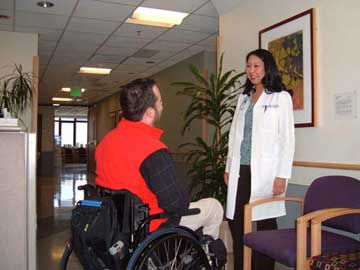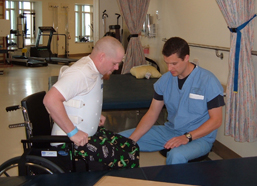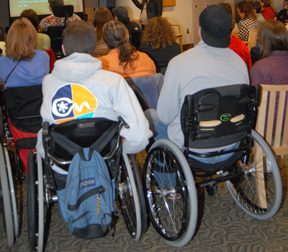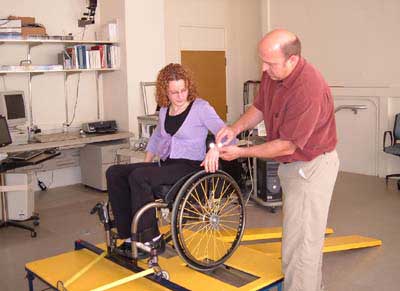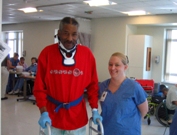Spinal Cord Injury Update
Winter 2005: Volume 14, Number 1
SCI Peers-Making a Difference
After a traumatic, life-altering event like a spinal cord injury, it often helps to talk to someone who has been through a similar experience (a "peer") and has made a successful adjustment to life with SCI. Peers can personally relate to the experience of trauma, hospitalization and reentry into the community to a degree that others-family members and hospital staff-cannot.
It can be argued that peer support for SCI patients is more important now than ever before. In this era of reduced length-of-stay for inpatient rehabilitation, patients with acute SCI are often discharged before their medical neurological status has stabilized, and may leave the rehabilitation center feeling overwhelmed by the medical, psychosocial and other challenges of life with SCI. Clinical experience suggests that these patients are more vulnerable to a variety of medical and emotional problems now than when insurance coverage allowed a longer, more appropriate length-of-stay.
While peer mentors have been enlisted in the past to assist newly injured individuals at both Harborview and University of Washington Medical Centers, a 2003 grant from the Christopher Reeve Paralysis Foundation (CRPF) allowed Dr. Diana Cardenas, director of the Northwest Regional Spinal Cord Injury System (NWRSCIS), to create a coordinated peer mentoring program that serves all newly injured SCI patients at both hospitals.
Chris Garbaccio, who has paraplegia, was hired to coordinate the program. He oversaw recruitment and training of the 22 peers currently participating in the project, and works with hospital staff to match newly injured SCI inpatients with peer mentors of the same sex and similar injury level, age, and life circumstances. While no two spinal cord injuries (even at the same level) are exactly alike, efforts are made to match individuals as closely as possible.
Peer mentors meet with patients while they are still in the hospital and again after discharge. The post-discharge visits allow peers to address questions that often don't arise until after a patient returns home. Peers also help patients identify issues that might require further follow-up by the rehabilitation team.
Remembering what it was like for her when she was first injured, one peer commented, "You need to have someone you can talk to after you get home, someone who can connect you with the right people and resources."
Patient satisfaction questionnaires are used to evaluate the program and identify areas needing improvement.
The patient response so far has been overwhelmingly positive. "Unless a friend or family member has a spinal cord injury, no one ever thinks about it until it happens to them," Garbaccio commented. "Suddenly, you are lying in a hospital bed wondering what your life will be like from now on. A peer mentor can remove much of the mystery. One of the first patients I had contact with saw my wheelchair and hospital badge and said, 'Oh, you work here?' and visibly brightened."
For more information about the SCI Peer Mentoring Program, contact Chris Garbaccio at cbaccio@u.washington.edu or 206-616-8568

